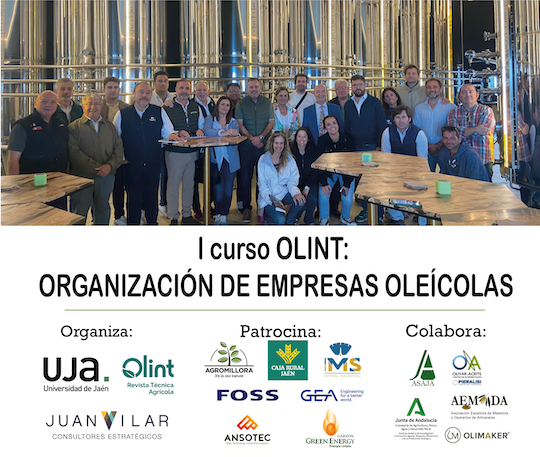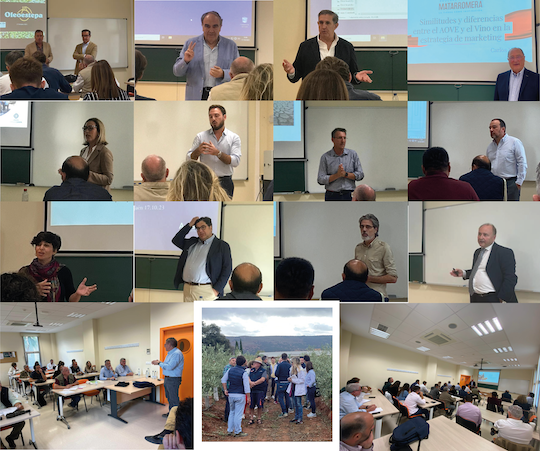The Rector of the University of Jaén, Nicolás Ruiz, closes the I Edition of the Course OLINT – Organization of Olive Oil Companies. Organized by the University of Jaén, Olint – Olive Oil Technical Magazine and Juan Vilar Strategic Consultants. Directed by the professor in Business Organization, María Jesús Hernández, and the strategic consultant and professor on leave of absence from the UJA, Juan Vilar.
This first edition was attended by more than 27 students from various countries, from the producer, industrial, cooperative, packaging and distribution sector, as well as people who are not exclusively dedicated to the olive sector, but want to have a global vision of it.
The main objectives achieved in the course are the analysis of the management of olive companies from the hand of reference personnel in this sector; to expose from experience the main milestones to be pursued for the increase of the net income of all the links in the olive value chain; to propose competitive strategies to adopt for its achievement and the optimization of available resources to achieve a sustainable olive growing.
All this with real testimonies that have motivated the agents involved in the olive oil production process, from the producer sector to the bottling sector, promoting the improvement of the economic profitability of their farm or entity.
The I Edition of the Olint Course – Organization of Olive Companies has been sponsored by AGROMILLORA Group, ANSOTEC, Caja Rural de Jaén, FOSS, Garzón Green Energy, GEA Westfalia Separator Ibérica and IMS – Industrial Weighing. And it has counted with the collaboration of the Junta de Andalucía, ASAJA, Centro de Interpretación del Olivar y el Aceite de Oliva de PIERALISI and OLIMAKER.
The course program has been developed by leading speakers in the olive sector and related sectors. All of them with extensive experience in leading companies of international recognition.
Antonio Luque, President of DCOOP, was the speaker in charge of inaugurating this first edition, who made a tour of the olive sector, focusing his presentation on agriculture and sustainability, taking into account the scarce and valuable resources such as water and highlighting the importance of training in the sector.
Next, Carlos Jiménez, COO of ACESUR, stressed the importance of generating added value of olive oil from the origin; Álvaro Olavarría, General Manager of OleoEstepa, who explained the development of the cooperative group, a benchmark in olive oil quality as a competitive advantage; Eduardo Valverde – Manager of SCA Conde de Benalúa, explained the new example of corporativism in which the loyalty of the member in exchange for their freedom in decision making is a priority; Carmen Morillo, Financial Director of Grupo Oleícola Jaén, indicated the main lines of the competitive strategy of vertical integration towards the origin developed by the company; Carmelo Sánchez – CEO of Terranovus focused on the importance of innovation as a contribution of value; and Antonio Estévez – CEO of Nutesca, on the strategies to be applied in a changing environment and the impact of climate change in agriculture.
The second day of the course, eminently practical, consisted of a visit to several high-density olive grove farms in the province of Jaén, introducing the students to new varieties of olive groves.
The teachers and students then travelled to Baeza to visit the 5.0 olive mill of the Oleícola Jaén Group. Finally, the CEO of Olimaker, Luis Serrano, conducted a tasting of new varieties of EVOO and the students were able to carry out the extractability tests themselves.
The third and last day was held at the UJA Campus, with presentations by Carlos Moro, President of Bodegas Familiares Matarromera, similarities and differences between EVOO and wine in the marketing strategy; Juan Carlos Marín – Head of Ultramarinos de ALCAMPO Linares, whose presentation was oriented to the impact of the consumer with a differentiated shelf; Jesús Cuervas – CEO of Cuervas Intermediación, and how to deal with the supply of olive oils in a turbulent environment; Enrique Moreno – Manager of Cabello X Mure, who instructed the students on brand identity as a competitive advantage; Juan Ramón Hidalgo – CEO of Food Legal Solutions, addressed food safety and the management of the potential associated risk; Concepción Muñoz – Professor at the UCO explained to the students how climate change affects the olive grove; then Gabriel Beltrán – Senior Scientist at IFAPA, Rafael López – Technical Director of IADA IEnrique Moreno – Manager of Cabello X Mure, who instructed the students on brand identity as a competitive advantage; Juan Ramón Hidalgo – CEO of Food Legal Solutions, addressed food safety and the management of the potential associated risk; Concepción Muñoz – Professor of the UCO explained to the students how climate change affects the olive grove; then Gabriel Beltrán – Senior Scientist of IFAPA, Rafael López – Technical Director of IADA Ingenieros and Miguel Ángel Espinosa – Market Manager for inputs of ACESUR focused their presentation on the process of elaboration of olive oil and its impact on the quality of the final product and its market orientation; José Antonio La Cal – Associate Professor of the UJA, and his presentation on the valorization of by-products as a competitive advantage.
To close the course, the Rector of the University of Jaén, Nicolás Ruiz, underlined the university’s commitment to the olive sector, so important for the province of Jaén, to facilitate progress and adaptation to the new challenges facing the olive grove, olive oil and the primary sector in general. This is materialized in the training and dissemination activities carried out, in the lines of research and the transfer of knowledge to society.


